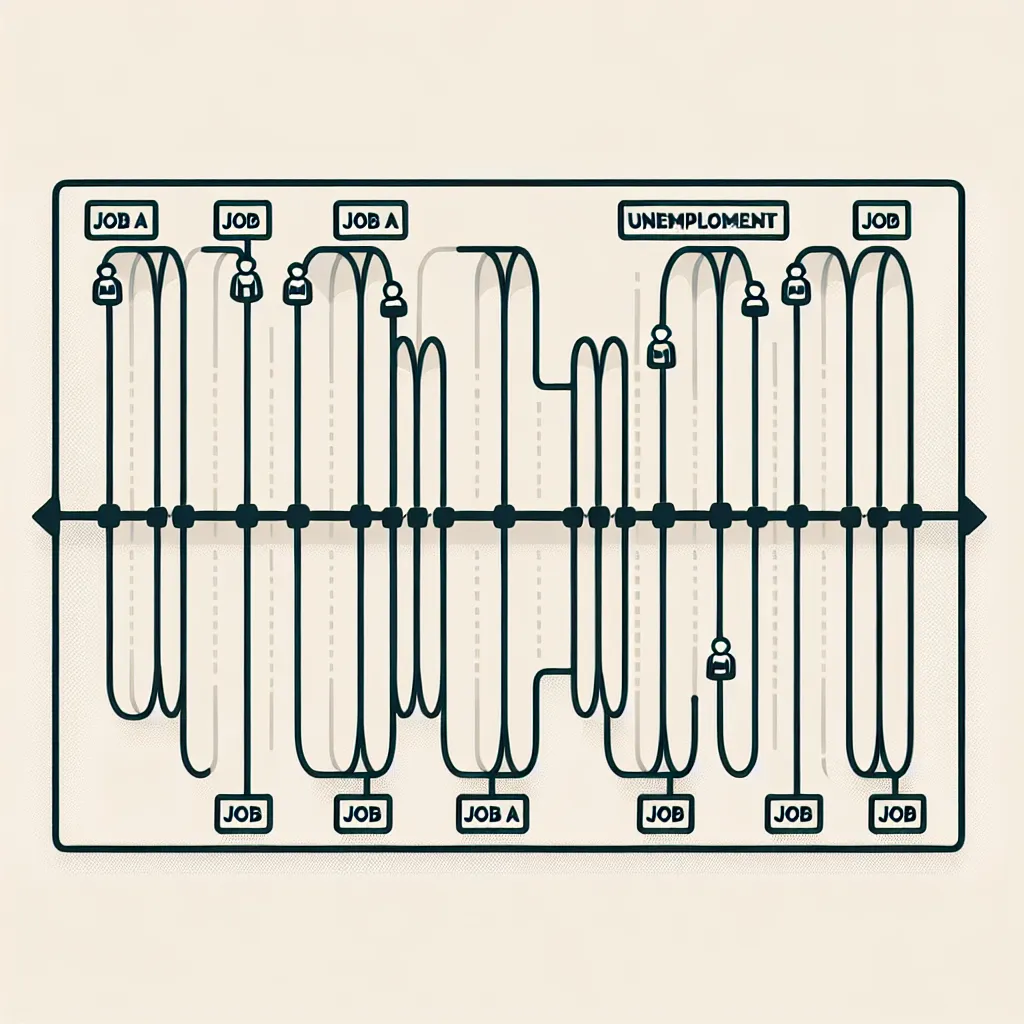In today’s competitive job market, having gaps in your resume can be a source of anxiety for many job seekers. However, with the right approach and preparation, you can effectively explain these gaps during your English job interview and turn them into positive talking points. This guide will provide you with strategies and tips on how to address resume gaps confidently and professionally in English.
Understanding Resume Gaps and Their Importance
Resume gaps refer to periods of unemployment or time away from the workforce that appear on your resume. These gaps can occur for various reasons, such as taking time off to raise children, caring for a sick family member, pursuing further education, or experiencing extended unemployment due to economic factors.
 Resume gaps illustration
Resume gaps illustration
Employers often pay attention to these gaps because they want to understand your career trajectory and ensure that you’re a reliable and committed candidate. However, it’s important to remember that having gaps in your resume is not inherently negative. The key is how you explain them during your interview.
Strategies for Explaining Resume Gaps in English
1. Be Honest and Transparent
The most crucial aspect of explaining resume gaps is honesty. Lying about your employment history or trying to cover up gaps can severely damage your credibility if discovered. Instead, be upfront about the gaps and focus on presenting them in the best possible light.
Example:
“I took a year off between jobs to care for my elderly parent. While it was challenging, I learned valuable skills in time management and compassionate care that I believe will benefit me in this role.”
2. Focus on Personal Growth and Development
If you used your time away from work to develop new skills, volunteer, or pursue personal projects, emphasize these aspects. This shows that you remained productive and proactive during your time off.
Example:
“During my six-month career break, I completed an online course in digital marketing and volunteered at a local non-profit organization. These experiences broadened my skill set and gave me fresh perspectives that I’m excited to bring to this position.”
3. Highlight Relevant Experiences
Even if you weren’t formally employed, you may have gained experiences that are relevant to the job you’re applying for. Don’t hesitate to mention these.
Example:
“While I was out of the traditional workforce for two years to raise my children, I managed our family budget, coordinated numerous community events, and even started a small online business. These experiences honed my organizational and multitasking skills, which are crucial for the project management role I’m applying for.”
4. Use Positive Language
Frame your explanation in positive terms. Instead of apologizing for the gap, present it as a period of growth or a conscious choice that has ultimately prepared you for this new opportunity.
Example:
“I chose to take a sabbatical year to travel and immerse myself in different cultures. This experience has greatly enhanced my adaptability and cross-cultural communication skills, which I believe will be valuable in this global marketing position.”
5. Keep It Concise
While it’s important to explain your gap, avoid going into unnecessary detail. Provide a brief, clear explanation and then steer the conversation back to your qualifications and enthusiasm for the position.
Example:
“There was a eight-month gap in my employment when my previous company downsized. I used that time to update my technical skills and am now eager to apply my enhanced expertise to this role.”
Common Interview Questions About Resume Gaps and How to Answer Them
1. “Can you explain this gap in your resume?”
Answer: “Certainly. After my previous role at XYZ Company, I took a year off to pursue my MBA. This educational experience has equipped me with advanced analytical and leadership skills that I’m excited to bring to this position.”
2. “What did you do during this period of unemployment?”
Answer: “During that six-month period, I focused on enhancing my professional skills. I completed several online certifications in project management and data analysis, which are directly relevant to this role. I also did some freelance work, which kept me engaged with industry trends.”
3. “Why were you out of work for so long?”
Answer: “The economic downturn in our industry led to widespread layoffs, including my position. While it took some time to find the right opportunity, I used this period to network, stay updated with industry developments, and refine my skills. I’m now more equipped than ever to contribute effectively to your team.”
4. “How do you know you’re ready to return to work after such a long break?”
Answer: “I’ve always been committed to my professional growth, even during my break. I’ve kept myself updated with industry trends, maintained my professional network, and even taken on some freelance projects. I’m energized and fully prepared to dive back into a full-time role and contribute my skills and fresh perspectives to your team.”
5. “Aren’t you concerned about your skills being outdated after this gap?”
Answer: “I understand that concern, but I’ve been proactive about keeping my skills current. During my time away, I completed several online courses in [relevant skills], participated in industry webinars, and even worked on some personal projects that allowed me to apply my skills practically. I’m confident that I’m up-to-date and ready to contribute effectively from day one.”
Common Mistakes to Avoid When Explaining Resume Gaps
-
Being defensive: Avoid getting defensive about your gap. Instead, approach the topic with confidence and positivity.
-
Oversharing personal details: While honesty is important, avoid sharing unnecessary personal details that aren’t relevant to your professional capabilities.
-
Lack of preparation: Not being ready to discuss your resume gap can make you appear unprofessional or dishonest.
-
Focusing too much on the gap: Don’t let the gap dominate the interview. Briefly address it and then steer the conversation back to your qualifications and enthusiasm for the role.
-
Apologizing excessively: There’s no need to apologize for a resume gap. Present it as a part of your professional journey.
 Interview preparation
Interview preparation
Additional Tips for Handling Resume Gaps in English Interviews
-
Practice your explanation: Rehearse your explanation for the gap so you can deliver it confidently and naturally during the interview.
-
Update your skills: If your gap is recent or ongoing, take steps to update your skills through online courses, volunteering, or freelance work.
-
Use your cover letter: If appropriate, briefly address the gap in your cover letter to preemptively address any concerns.
-
Highlight your enthusiasm: Express your eagerness to return to work and contribute to the company.
-
Be prepared for follow-up questions: The interviewer may ask for more details, so be ready to provide additional context if necessary.
Conclusion
Explaining gaps in your resume during an English interview doesn’t have to be a daunting task. With honesty, preparation, and a positive attitude, you can address these gaps effectively and even turn them into strengths. Remember, many successful professionals have had career breaks for various reasons. The key is to show how you’ve grown from the experience and how it’s prepared you for the role you’re seeking. By following the strategies and tips outlined in this guide, you’ll be well-equipped to handle questions about resume gaps with confidence and professionalism.




